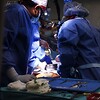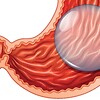Fritextsökning
Artiklar per år
Innehållstyper
-

Column: ”Authentic leadership and clear mandates pave the way for more female CEOs”
”I believe that the aspect of having clear mandates and titles on the one hand and women progressing into top positions must be explored further”, Helena Strigård writes in a column.
-

Individual DNA passport could result in fewer drug side effects
You may be required to show a DNA passport when you pick up medicines at the pharmacy in the future. According to a new study, patients might suffer 30% fewer side effects if the drug treatment is adapted to their genes.
-

Claims of life science companies fleeing abroad is a myth according to survey
The claim that life science companies are moving abroad is exaggerated. In fact, only a tiny percentage is leaving the country, according to a survey.
-

Column: ”We need to exploit the benefits of the regulations“
You don’t need to search long on the Internet to find lists of the most innovative countries with Sweden ranking at the top. Sweden generally offers good conditions for growing new solutions, but it is also becoming increasingly clear that we are challenged in one area – regulations, writes Björn Arvidsson in a column.
-

The government proposes fines for pharmaceutical companies that fail to notify drug shortages in time
According to a compilation from the Swedish Medicines Agency, the number of residually notified medicines increased by 54 % in Sweden last year compared to the previous year. In a bill presented by the government a number of proposals are put forward to counteract the problem.
-

Kraftigt ökad läkemedelförsäljning – här är bolagen som sålde mest
Fjolåret bjöd på en kraftig försäljningsökning i Sverige för de största läkemedelsföretagen. Åtta av tio företag på tio i topp-listan ökade med mer än tio procent, visar en sammanställning.
-

"Unclear proposal from the EU Commission on how to solve the MDR challenges"
Even before the EU regulation on medical devices (MDR) came into force, medical technology companies and doctors were concerned that it would endanger the availability of medical devices in the EU. Unfortunately, the fears have come true.
-

Missnöjd med din julklappsslips? Här är våra läsetips
-

Ny ordförande för Atlas Antibodies
Åsa Riisberg, styrelseproffs och tidigare partner i EQT, tar över ordförandeklubban i Atlas Antibodies.
-

She creates pharmaceuticals on a 3D printer
The correct dosage for each individual, regardless of whether the pharmaceutical is for a seriously ill child or a frail elderly person, is the mission of a well-advanced project with 3D-printed drugs at Uppsala University. “It will soon be available in clinics”, says Christel Bergström, who is heading the project.
-

The most important Swedish medical innovations: Our ranking
Life Science Sweden turns 20 years old – and celebrates by producing a top list of the 20 most important contemporary Swedish innovations in the field of medicine.
-

Viktigaste medicinska innovationerna plats 13-20
En metod som revolutionerade strålbehandlingen, ett förband som minskar risken för antibiotikaresistens och en teknik som hjälper bland andra ALS-patienter att kommunicera. Det är några av uppfinningarna som intar platserna 13-20 på Life Science Swedens rankning av de viktigaste svenska nutida innovationerna inom medicinområdet.
-

Här är hela listan – De viktigaste svenska medicininnovationerna
Högst upp på Life Science Swedens rankning över moderna svenska innovationer inom medicinområdet finns Losec från dåvarande Astra.
-
Spermosens vd slutar
Medicinteknikbolaget Spermosens vd John Lempert har beslutat sig för att avgå.
-

Medicinjättar högt på topplista när Sveriges bästa arbetsplatser rankas
Att jobba inom medtech eller life science kan innebära att man har Sveriges bästa arbetsgivare. Det enligt en ny lista där medarbetarna själva fått tycka till.
-

Neanderthal genes and Nobel Prize in a popular lecture at Bioscience
An inherited gene variant from our ”evolutionary cousins” – the extinct Neanderthals – may affect how our bodies break down certain drugs. “It’s only a matter of time before we actively start screening for it,” said KI researcher Hugo Zeberg when
-

"Are we doing business the wrong way around in the Life Science Sector?"
For the past 50 years we have created solutions for problems that we thought would solve the problems. Pharmaceuticals have created big block buster drugs which were great for that time but now we realise that these drugs were in fact only tested in white men and certainly not for patients who are older who are taking a number of medications.
-

FDA-kommitté förordar Astra Zenecas nya astmabehandling
En rådgivande kommitté till den amerikanska läkemedelsmyndigheten FDA rekommenderar Astra Zenecas preparat PT027 som en behandling mot astma för vuxna, uppger bolaget i ett pressmeddelande.
-

Nya platschefen: ”Strängnäs-anläggningen en viktig nod i Pfizers nätverk”
Den nya chefen på Pfizers anläggning i Strängnäs är civilingenjör i maskinteknik i grunden och det var inte alls självklart att han skulle jobba inom läkemedelsindustrin. 19 år senare är Johan Carlsson fast.
-

Edward Kim blir ny CMO hos Orexo
Läkemedelsbolaget Orexo har utsett Edward Kim till ny Chief Medical Officer. Han ersätter Michael Sumner som går vidare till bolagets amerikanska dotterbolag i New Jersey.
-

Alert from the Swedish Medicines Agency: Many complications with gastric balloons
According to the Swedish Medicines Agency, an increasing number of serious complications are being reported in procedures with gastric balloons as a method for weight loss. The authority fears significant shortcomings in the information to patients both before and after the procedure.
-

“We need to build flexible operating theatres”
Flexible operating theatres, micro-sensors on surgeons to monitor their well-being and 3D images projected onto organs to be operated on. These are a few ideas that three specialist surgeons are suggesting for the operating theatre of the future.
-

Biosimilars bring price pressure, but are they sufficiently used?
When biosimilars were introduced just over 16 years ago, hopes were raised that they would give many more patients access to effective but otherwise extremely expensive treatments with biological drugs. So, how well has Swedish healthcare used
-

Bought a tablet factory – and built his own empire
In 1995, Thomas Eldered was CEO of one of Pharmacia’s factories in the Stockholm area when the Swedish pharmaceutical giant, after a takeover, decided to move its production abroad. 34-year-old Thomas was facing an imminent risk of losing his job. However, instead, it actually turned out to be the starting point for one of the biggest success stories in Swedish life science.